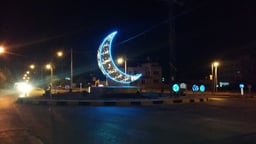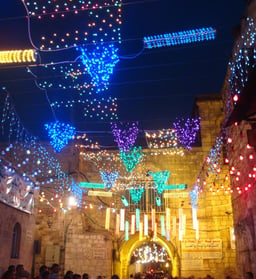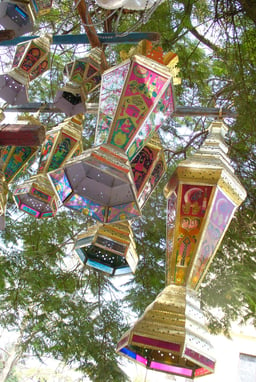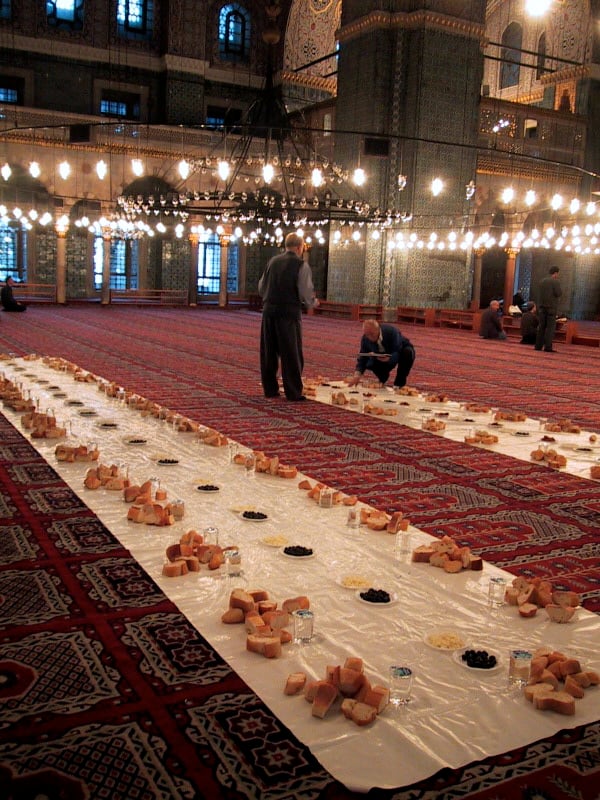Ramadan
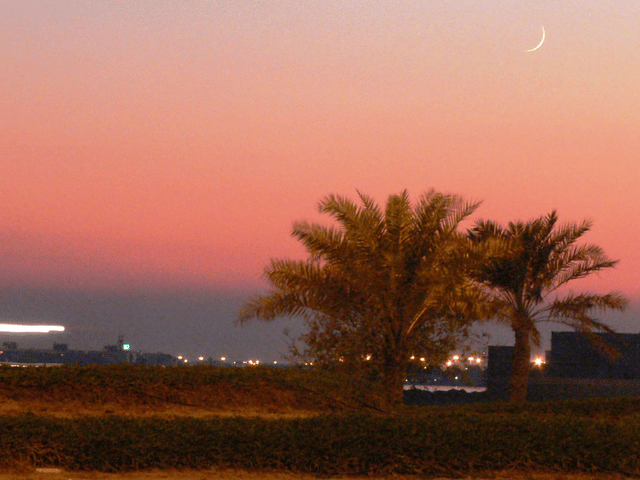
Ramadan

| Ramadan رمضان | |
|---|---|
| Observed by | Muslims |
| Type | Religious |
| Celebrations | Community iftars and Community prayers |
| Observances |
|
| Begins | At the last night of the month of Sha'ban[2] |
| Ends | At the last night of the month of Ramadan[2] |
| Date | Variable (follows the Islamic lunar calendar)[3][4] |
| 2019 date | 6 May – 3 June[3][5] |
| 2020 date | evening of 23 April (22 April for Mali; 24 April for Australia, Bangladesh, Brunei Darussalam, India, Iran, Morocco, Nepal, Oman, Pakistan, South Africa and Sri Lanka)[6] – 23 May (expected)[3] |
| Frequency | every year (lunar calendar) |
| Related to | Eid al-Fitr, Laylat al-Qadr |
Ramadan (/ˌræməˈdɑːn/, also US: /ˌrɑːm-, ˈræmədɑːn, ˈrɑːm-/,[7][8][9] UK: /ˈræmədæn/;[10] Arabic: رمضان, romanized: Ramaḍān [ramaˈdˤaːn];[1] Ramazan, Ramzan, Ramadhan, or Ramathan) is the ninth month of the Islamic calendar,[11] observed by Muslims worldwide as a month of fasting (sawm), prayer, reflection and community.[12] A commemoration of Muhammad's first revelation, the annual observance of Ramadan is regarded as one of the Five Pillars of Islam[13] and lasts twenty-nine to thirty days, from one sighting of the crescent moon to the next.[14][15]
Fasting from sunrise to sunset is fard (obligatory) for all adult Muslims who are not acutely or chronically ill, travelling, elderly, pregnant, breastfeeding, diabetic, or menstruating.[16] The predawn meal is referred to as suhur, and the nightly feast that breaks the fast is called iftar.[17][18] Although fatwas have been issued declaring that Muslims who live in regions with a midnight sun or polar night should follow the timetable of Mecca,[19] it is common practice to follow the timetable of the closest country in which night can be distinguished from day.[20][21][22]
The spiritual rewards (thawab) of fasting are believed to be multiplied during Ramadan.[23] Accordingly, Muslims refrain not only from food and drink, but also tobacco products, sexual relations, and sinful behavior,[24][25] devoting themselves instead to salat (prayer), recitation of the Quran,[26][27] and the performance of charitable deeds as they strive for purity and heightened awareness of God (taqwa).
| Ramadan رمضان | |
|---|---|
| Observed by | Muslims |
| Type | Religious |
| Celebrations | Community iftars and Community prayers |
| Observances |
|
| Begins | At the last night of the month of Sha'ban[2] |
| Ends | At the last night of the month of Ramadan[2] |
| Date | Variable (follows the Islamic lunar calendar)[3][4] |
| 2019 date | 6 May – 3 June[3][5] |
| 2020 date | evening of 23 April (22 April for Mali; 24 April for Australia, Bangladesh, Brunei Darussalam, India, Iran, Morocco, Nepal, Oman, Pakistan, South Africa and Sri Lanka)[6] – 23 May (expected)[3] |
| Frequency | every year (lunar calendar) |
| Related to | Eid al-Fitr, Laylat al-Qadr |
Etymology
The word Ramadan derives from the Arabic root ramiḍa or ar-ramaḍ "scorching heat," "dryness."[28]
History

Chapter 2, Verse 185 in Arabic.
Muslims hold that all scripture was revealed during Ramadan, the scrolls of Abraham, Torah, Psalms, Gospel, and Quran having been handed down on the first, sixth, twelfth, thirteenth (in some sources, eighteenth)[29] and twenty-fourth Ramadans, respectively.[30] Muhammed is said to have received his first quranic revelation on Laylat al-Qadr, one of five odd-numbered nights that fall during the last ten days of Ramadan.[31]
Although Muslims were first commanded to fast in the second year of Hijra (624 CE),[30] they believe that the practice of fasting is not in fact an innovation of monotheism[32] but rather has always been necessary for believers to attain taqwa (the fear of God).[33][Quran 2:183 [113] ] They point to the fact that the pre-Islamic pagans of Mecca fasted on the tenth day of Muharram to expiate sin and avoid drought.[34] Philip Jenkins argues that the observance of Ramadan fasting grew out of "the strict Lenten discipline of the Syrian Churches," a postulation corroborated by other scholars, including theologian Paul-Gordon Chandler,[35][36] but disputed by some Muslim academics.[37]
Important dates
The first and last dates of Ramadan are determined by the lunar Islamic calendar.[38]. Other important dates include 21st, 23rd, 25th, 27th and 29th night of Ramadan. These nights are called (Taq-raat).
Beginning
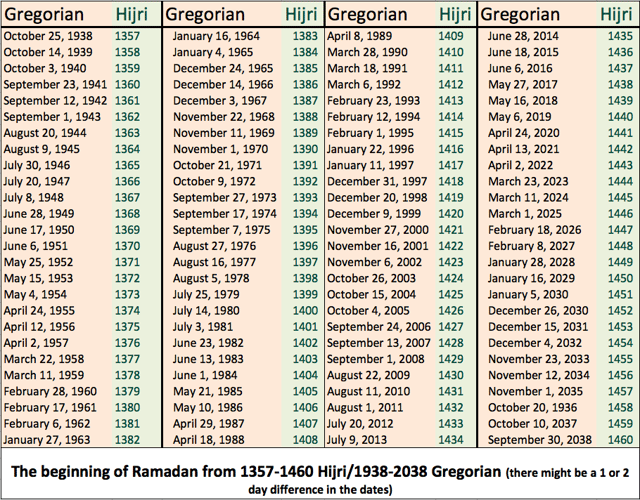
Ramadan beginning dates between Gregorian years 1938 and 2038.
Because Hilāl, the crescent moon, typically occurs approximately one day after the new moon, Muslims can usually estimate the beginning of Ramadan;[39] however, many prefer to confirm the opening of Ramadan by direct visual observation of the crescent.[40]
Night of Power
Eid
The holiday of Eid al-Fitr (Arabic:عيد الفطر), which marks the end of Ramadan and the beginning of Shawwal, the next lunar month, is declared after a crescent new moon has been sighted or after completion of thirty days of fasting if no sighting of the moon is possible. Eid celebrates of the return to a more natural disposition (fitra) of eating, drinking, and marital intimacy.[45]
Religious practices
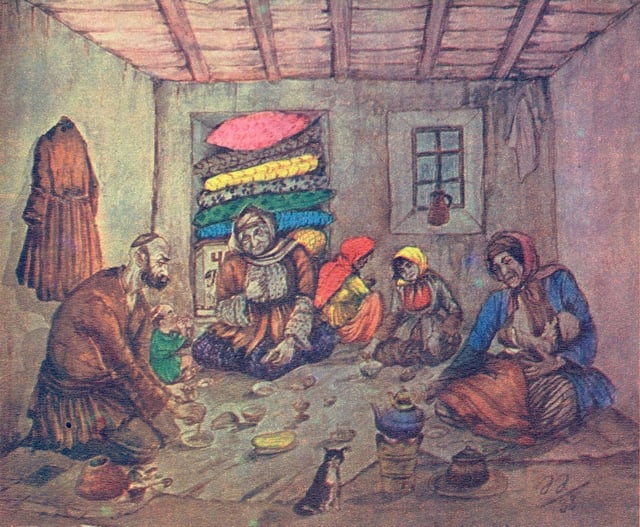
Azim Azimzade. Ramadan of the poor people. 1938
The common practice is to fast from dawn to sunset. The pre-dawn meal before the fast is called the suhur, while the meal at sunset that breaks the fast is called iftar.
Fasting
Ramadan is a time of spiritual reflection, self-improvement, and heightened devotion and worship. Muslims are expected to put more effort into following the teachings of Islam. The fast (sawm) begins at dawn and ends at sunset. In addition to abstaining from eating and drinking during this time, Muslims abstain from sexual relations[4] and sinful speech and behaviour. The act of fasting is said to redirect the heart away from worldly activities, its purpose being to cleanse the soul by freeing it from harmful impurities. Muslims believe that Ramadan teaches them to practice self-discipline, self-control,[49] sacrifice, and empathy for those who are less fortunate, thus encouraging actions of generosity and compulsory charity (zakat).[50]
Exemptions to fasting include travel, menstruation, severe illness, pregnancy, and breastfeeding. However, many Muslims with medical conditions insist on fasting to satisfy their spiritual needs, although it is not recommended by hadith. Those unable to fast are obligated make up the missed days later.[51]
Suhoor
Iftar
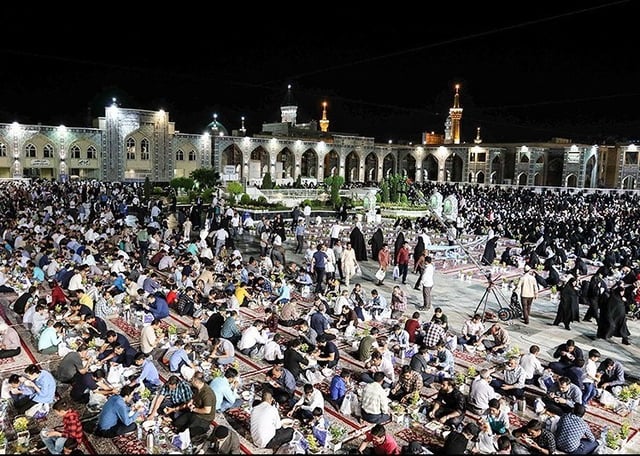
Iftar serving for fasting people in the Imam Reza shrine
At sunset, families break the fast with the iftar, traditionally opening the meal by eating dates to commemorate Muhammad's practice of breaking the fast with three dates. They then adjourn for Maghrib, the fourth of the five required daily prayers, after which the main meal is served.[54]
Social gatherings, many times in buffet style, are frequent at iftar. Traditional dishes are often highlighted, including traditional desserts, particularly those made only during Ramadan. Water is usually the beverage of choice, but juice and milk are also often available, as are soft drinks and caffeinated beverages.[55]
In the Middle East, iftar consists of water, juices, dates, salads and appetizers; one or more main dishes; and rich desserts, with dessert considered the most important aspect of the meal. Typical main dishes include lamb stewed with wheat berries, lamb kebabs with grilled vegetables, and roasted chicken served with chickpea-studded rice pilaf. Desserts may include luqaimat, baklava or kunafeh.[56]
Over time, the practice of iftar has involved into banquets that may accommodate hundreds or even thousands of diners.[57] The Sheikh Zayed Grand Mosque in Abu Dhabi, the largest mosque in the UAE, feeds up to thirty thousand people every night.[58] Some twelve thousand people attend iftar at the Imam Reza shrine in Mashhad.[59]
Charity
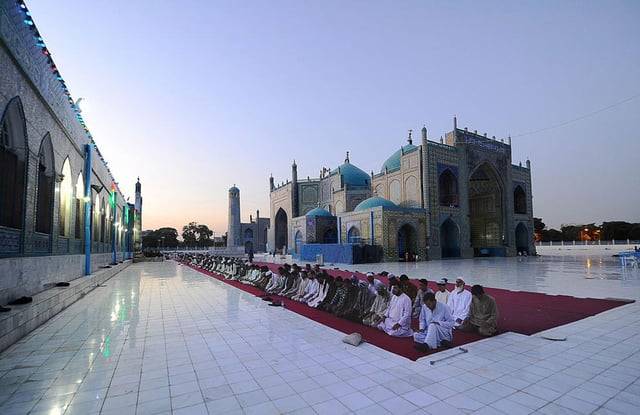
Men praying during Ramadan at the Shrine of Ali or "Blue Mosque" in Mazar-i-Sharif, Afghanistan
Zakāt, often translated as "the poor-rate", is the fixed percentage i-e 2.5% of income, a believer is required to give to the poor; the practice is obligatory as one of the pillars of Islam. Muslims believe that good deeds are rewarded more handsomely during Ramadan than at any other time of the year; consequently, many donate a larger portion—or even all—of their yearly zakāt during this month.
Nightly prayers
Tarawih (Arabic: تراويح) are extra nightly prayers performed during the month of Ramadan. Contrary to popular belief, they are not compulsory.[60]
Recitation of the Quran
Muslims are encouraged to read the entire Quran, which comprises thirty juz' (sections), over the thirty days of Ramadan. Some Muslims incorporate a recitation of one juz' into each of the thirty tarawih sessions observed during the month.[61]
Cultural practices
In some Islamic countries, lights are strung up in public squares and across city streets,[62][63][64] a tradition believed to have originated during the Fatimid Caliphate, where the rule of Caliph al-Mu'izz li-Din Allah was acclaimed by people holding lanterns.[65]
On the island of Java, many believers bathe in holy springs to prepare for fasting, a ritual known as Padusan.[66] The city of Semarang marks the beginning of Ramadan with the Dugderan carnival, which involves parading the Warak ngendog, a horse-dragon hybrid creature allegedly inspired by the Buraq.[67] In the Chinese-influenced capital city of Jakarta, firecrackers are widely used to celebrate Ramadan, although they are officially illegal.[68] Towards the end of Ramadan, most employees receive a one-month bonus known as Tunjangan Hari Raya.[69] Certain kinds of food are especially popular during Ramadan, such as large beef or buffalo in Aceh and snails in Central Java.[70] The iftar meal is announced every evening by striking the bedug, a giant drum, in the mosque.[71]
Common greetings during Ramadan include Ramadan mubarak and Ramadan kareem.[72]
During Ramadan in the Middle East, a mesaharati beats a drum across a neighbourhood to wake people up to eat the suhoor meal. Similarly in Southeast Asia, the kentongan slit drum is used for the same purpose.
Observance rates
According to a 2012 Pew Research Centre study, there was widespread Ramadan observance, with a median of 93 percent across the thirty-nine countries and territories studied.[73] Regions with high percentages of fasting among Muslims include Southeast Asia, South Asia, Middle East and North Africa, and most of Sub-Saharan Africa.[73] Percentages are lower in Central Asia and Southeast Europe.[73]
Laws
In some Muslim countries, failing to observe the Ramadan fast is a crime. The sale of alcohol is prohibited in Egypt.[74] In Kuwait, the penalty for eating, drinking or smoking during daytime is a fine of no more than one hundred Kuwaiti dinar or incarceration for no more than one month, or both.[75][76] In some United Arab Emirates jurisdictions, eating or drinking in public is considered a minor offence punishable by up to one hundred fifty hours of community service.[77] Courts in Saudi Arabia, described by The Economist as taking Ramadan "more seriously than anywhere else",[78] may impose harsher punishments, including flogging, imprisonment and, for foreigners, deportation.[79][80] In Malaysia, breaking the fast prior to sundown may result in arrest by the religious police, while the sale of food, drink, or tobacco for immediate consumption can incur a fine of up to one thousand ringgit and six months' imprisonment, penalties that are doubled for repeat offenses.[81] Courts in Algeria have imposed fines and prison sentences for violations of Ramadan regulations.[82]
Health
The education departments of Berlin and the United Kingdom have tried to discourage students from fasting during Ramadan, as they claim that not eating or drinking can lead to concentration problems and bad grades.[86][87]
A review of the literature by an Iranian group suggested fasting during Ramadan might produce renal injury in patients with moderate (GFR <60 ml/min) or severe kidney disease but was not injurious to renal transplant patients with good function or most stone-forming patients.[88]
Crime rates
The correlation of Ramadan with crime rates is mixed: some statistics show that crime rates drop during Ramadan, while others show that it increases. Decreases in crime rates have been reported by the police in some cities in Turkey (Istanbul[89] and Konya[90]) and the Eastern province of Saudi Arabia.[91] A 2005 study found that there was a decrease in assault, robbery and alcohol-related crimes during Ramadan in Saudi Arabia, but only the decrease in alcohol-related crimes was statistically significant.[92] Increases in crime rates during Ramadan have been reported in Turkey,[93] Jakarta,[94][95][96] parts of Algeria,[97] Yemen[98] and Egypt.[99]
Various mechanisms have been proposed for the effect of Ramadan on crime:
An Iranian cleric argues that fasting during Ramadan makes people less likely to commit crimes due to spiritual reasons.[100] Gamal al-Banna argues that fasting can stress people out, which can make them more likely to commit crimes. He criticized Muslims who commit crimes while fasting during Ramadan as "fake and superficial".[99]
Police in Saudi Arabia attributed a drop in crime rates to the "spiritual mood prevalent in the country".[91]
In Jakarta, Indonesia, police say that the traffic due to 7 million people leaving the city to celebrate Eid al-Fitr results in an increase in street crime. As a result, police deploy an additional 7,500 personnel.[96]
During Ramadan, millions of pilgrims enter Saudi Arabia to visit Mecca. According to the Yemen Times, such pilgrims are usually charitable, and consequently smugglers traffic children in from Yemen to beg on the streets of Saudi Arabia.[98]
Ramadan in polar regions
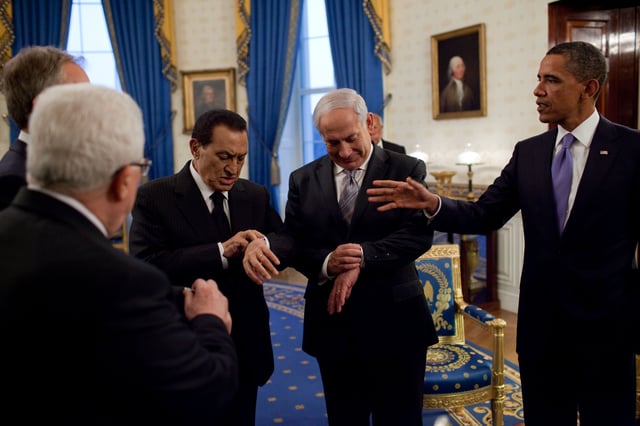
During 2010 Middle East negotiations in the United States, Hosni Mubarak and Benjamin Netanyahu check their watches to see if the Sun has set.
The length of the dawn to sunset time varies in different parts of the world according to summer or winter solstices of the Sun. Most Muslims fast for eleven to sixteen hours during Ramadan. However, in polar regions, the period between dawn and sunset may exceed twenty-two hours in summer. For example, in 2014, Muslims in Reykjavik, Iceland, and Trondheim, Norway, fasted almost twenty-two hours, while Muslims in Sydney, Australia, fasted for only about eleven hours. In areas characterized by continuous night or day, some Muslims follow the fasting schedule observed in the nearest city that experiences sunrise and sunset, while others follow Mecca time.[20][21][22]
Employment during Ramadan
Muslims continue to work during Ramadan[101][102]; however, in some Islamic countries, such as Oman and Lebanon, working hours are shortened.[103][104] It is often recommended that working Muslims inform their employers if they are fasting, given the potential for the observance to impact performance at work.[105] The extent to which Ramadan observers are protected by religious accommodation varies by country. Policies putting them at a disadvantage compared to other employees have been met with discrimination claims in the United Kingdom and the United States.[106][107][108]
See also
Fasting
Five Pillars of Islam

